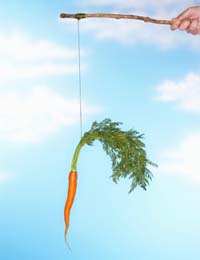
I’ve never been arrested, but I’m guessing if you really do only get the one phone call, you’d better use it wisely.
You can think of motivation in much the same way; it’s temporary, you’ve got it, and then you don’t. So while you have it, you’d better put it to good use.
‘Cool story, bro. I’ve never been arrested either, but what on earth are you talking about?!’
Here’s a scenario for ya. Maybe it sounds familiar?
For whatever reason, you make a decision to lose weight and get in shape, so you sign up to your local gym. Awesome, you joined a gym! It’s a proud moment and you got a sweet deal too; no joining fee, the first month is free and you only pay $12 a week for 24-hour access to state-of-the-art equipment. You’re gonna lose weight, get fit and finally look and feel how you’ve always wanted to. Congratulations, you were motivated and you did something.
Fast forward six months and you’ve been to the gym four times, shelled out $240 in membership fees and the number on the scales is still going in the wrong direction. What the hell went wrong?!
Here’s the problem: motivation is temporary and losing weight and getting fit is anything but quick. When we join a gym, start a new diet or sign up to a new weight loss programme, we’re motivated and keen to succeed. We know what we want to look like, we know how much we want to weigh, and we know the kinds of clothes we want to fit into. We’ve got a really clear idea of the results we want, so we start with a hiss and a roar! At first we’re dedicated to this new way of life, but at some point the pain we feel in our muscles and that constant feeling of hunger forces us to evaluate the results. We wanna know how we’re going, we want some feedback that tells us this pain is worth it. So maybe a couple of weeks into our new routine we jump on the scales…
… ‘Are you serious?! One kilogram, that’s it?! That’s all the weight I’ve lost?! All that effort, all that sacrifice, for one miserable kilogram?!
Bugger this, I’m getting a pie!’
So, what went wrong?
The effort versus the reward isn’t a fair exchange. When you feel like you’ve busted a gut exercising and deprived yourself of all the foods you’d like to be eating, one lone kilogram doesn’t feel like a fair return for all this work. Especially when you stack it up against the many, many kilograms you want to lose. That’s deflating and ultimately unmotivating. I know how that feels; it’s awful, you feel like it’s an impossible task and left wondering why you even bothered to try.
In my opinion the real trick to losing weight isn’t staying motivated, it’s finding a system where the need to be motivated becomes redundant. In other words: the reward outweighs the effort.
People much smarter than me call this a positive feedback loop. The Science Education Research Center at Carleton College in the US defines it this way: Positive feedback loops enhance or amplify changes; this tends to move a system away from its equilibrium state and make it more unstable.
Yeah, I prefer my definition too. The reward outweighs the effort. Simple, right? When the pain of doing something seems insignificant compared to the reward of jumping on the scales and seeing the numbers go down, you tend to keep working at it. That’s the loop part of a feedback loop. Effort + Positive Feedback = Repetition.
What can we learn from this? Well, motivation isn’t a bad thing, but it is fleeting, and you can’t rely on always having the necessary motivation to achieve your end goal. Instead of focussing on one big goal, set mini goals, tiny little goals. Achieve these little goals regularly and you’ll restart the feedback loop. Trust me; the reward will outweigh the effort. You’ll get used to this feeling of accomplishment and it’ll make you hungry for more, eventually it’ll become habit, and these are the habits that slowly develop into lasting lifestyle changes.
Shane Gosnell
This blog is the opinion and experiences of its author and should not be taken as medical or dietetic advice. Healthy Food Guide has not verified the content and cannot endorse any advice given. Healthy Food Guide recommends seeking professional health advice for specific complaints or symptoms, or before undertaking a weight-loss program.
www.healthyfood.com










